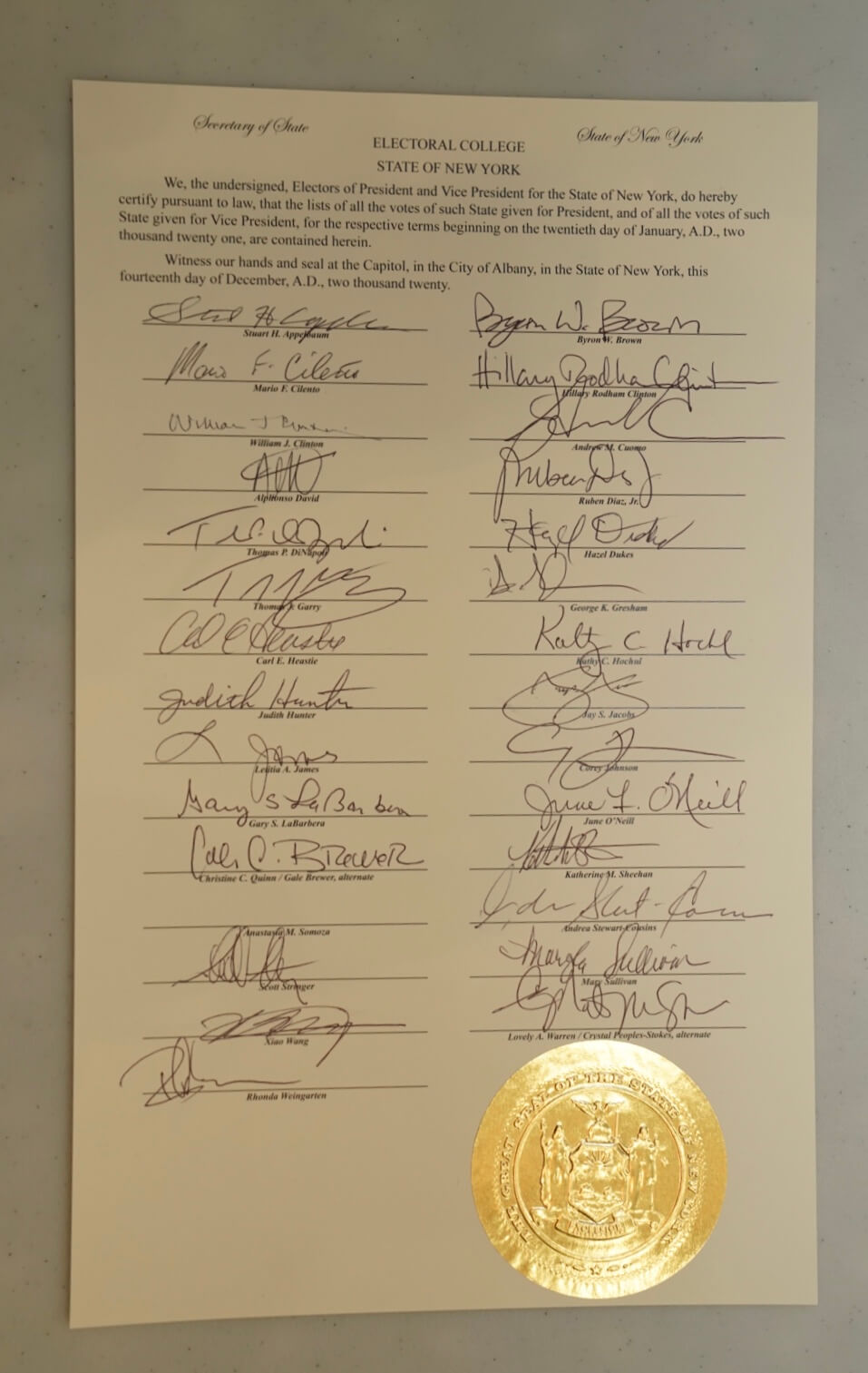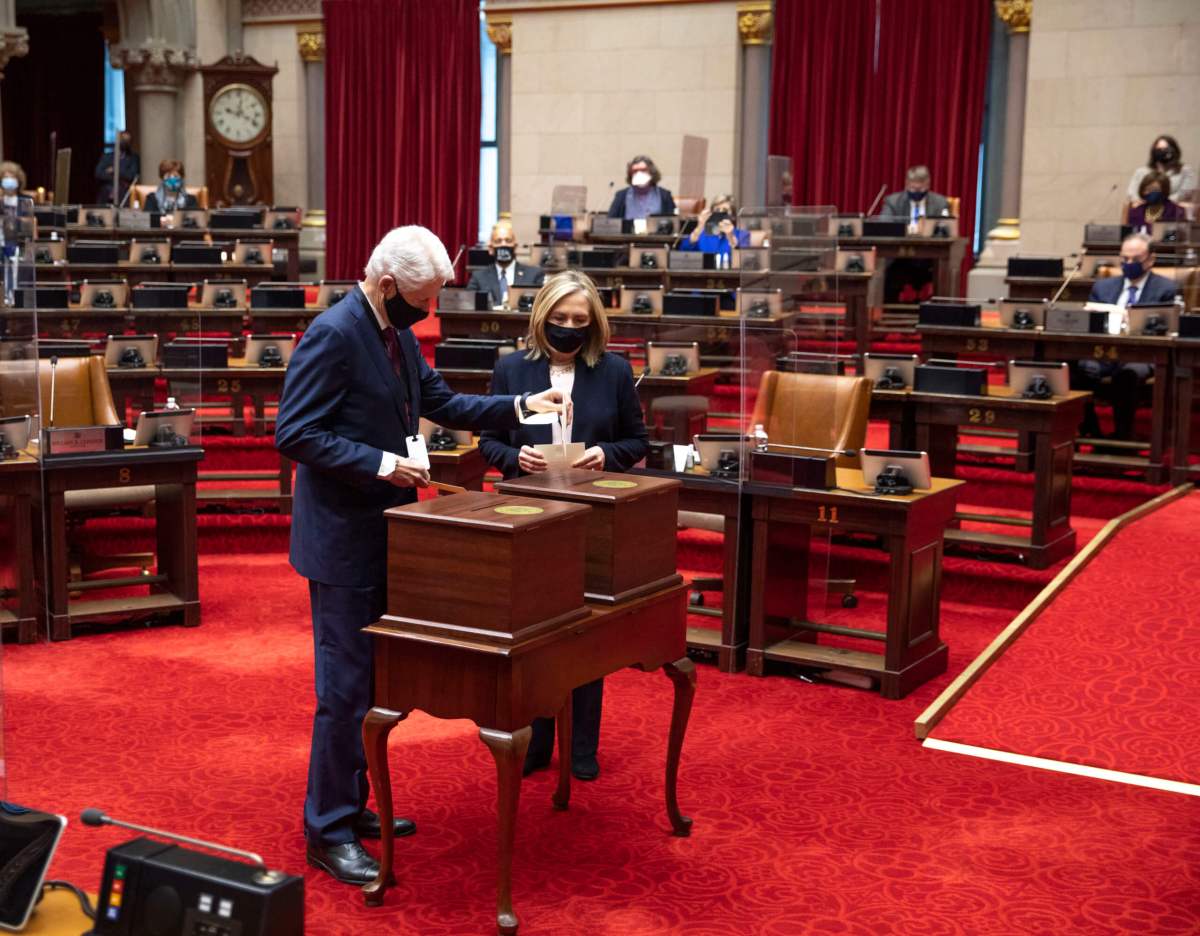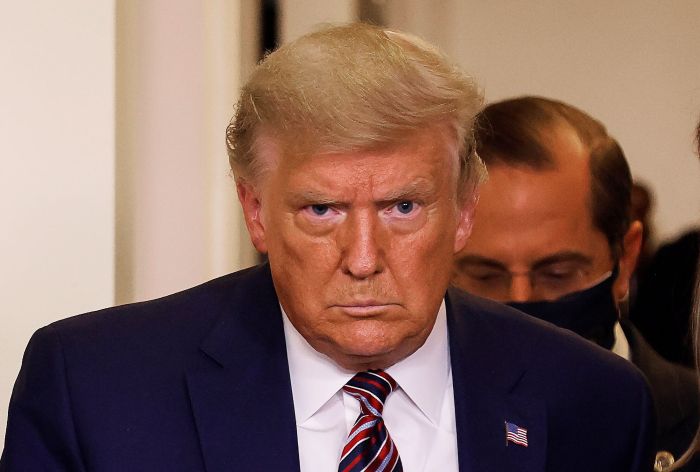BY MICHAEL MARTINA AND JULIA HARTE, Reuters
State by state, the U.S. Electoral College convened on Monday to formally confirm Democrat Joe Biden’s victory as the next U.S. president and effectively end President Donald Trump’s long-shot attempt to overturn the election results.
Biden went over the top just after 5:30 p.m. Monday, with California’s 55 electoral votes going to the president-elect.
Members of the Electoral College in Michigan, Pennsylvania, Georgia, Wisconsin and Arizona — battleground states won by Biden but challenged unsuccessfully in court by Trump — all cast the states’ electoral votes for the former vice president.
The Electoral College votes, traditionally a formality, have assumed outsized significance due to Trump’s unsubstantiated and false claims of widespread fraud in November’s poll.
New York’s 29 members of the Electoral College took their vote during a socially-distanced gathering at noon inside the State Assembly Chamber in Albany. Governor Andrew Cuomo presided over the proceedings. The quadrennial ceremony is usually held in the State Senate chambers, but was moved to the Assembly hall for the purposes of social distancing and proper ventilation amid the COVID-19 pandemic.
All 29 of New York’s electors went for President-elect Biden and Vice President-elect Kamala Harris.
Results for weeks have shown Biden won 306 Electoral College votes — exceeding the 270 needed to win — after four tumultuous years under the Republican Trump. Biden and Harris are due to take office on Jan. 20.
There was next to no chance that Monday’s voting will negate Biden’s victory and, with Trump’s legal campaign to reverse the results floundering, the president’s hopes of clinging to power will rest with a special meeting of the U.S. Congress on Jan. 6 where the odds against him are as good as insurmountable.
At 78 the oldest person to become U.S. president, Biden was due to make a speech at 8 p.m. ET on Monday about the Electoral College “and the strength and resilience of our democracy,” his transition team said in a statement.
Electors in Arizona, which Trump lost this year after winning there in 2016, cast the state’s 11 votes for Biden.
“While there will be those who are upset their candidate didn’t win, it is patently un-American and unacceptable that today’s event should be anything less than an honored tradition held with pride and in celebration,” Arizona Secretary of State Katie Hobbs said at the vote.
A Democrat, Hobbs said Trump’s claims of voter fraud had “led to threats of violence against me, my office, and those in this room today,” echoing similar reports of threats and intimidation in other states.
Under a complicated system dating back to the 1780s, a candidate becomes U.S. president not by winning a majority of the popular vote but through the Electoral College system, which allots electoral votes to the 50 states and the District of Columbia largely based on the size of their population.
Electors are typically party loyalists who represent the winning candidate in their state, with the exception of Maine and Nebraska, which give some of their Electoral College votes to the presidential candidate who won in the state’s congressional districts.
While there are sometimes a handful of “rogue” electors who vote for someone other than the winner of their state’s popular vote, the vast majority rubber-stamp the results.
Trump said late last month he would leave the White House if the Electoral College voted for Biden, but has since pressed on with his unprecedented campaign to overturn his defeat, filing without success numerous lawsuits challenging state vote counts.
On Monday, he repeated his usual unsupported claims of electoral fraud.
A group of Trump supporters called on Facebook for protests all day on Monday outside the state Capitol in Lansing, Michigan, one of the hardest-fought states where Trump lost.
But by early afternoon only a handful had gathered. Trump has called on Republican state legislators to appoint their own electors, essentially ignoring the will of the voters. State lawmakers have largely dismissed the idea.
Once the Electoral College vote is complete, Trump’s sole remaining gambit would be to persuade Congress not to certify the count on Jan. 6.
Any attempt to block a state’s results, and thus change the overall U.S. tally, must pass in both chambers of Congress that day. Republicans would very likely fail to stop Biden taking office as planned on Jan. 20 because Democrats control the House of Representatives and several Republican senators have acknowledged Biden’s victory.
In 2016, Trump won the Electoral College despite losing the popular vote to Democrat Hillary Clinton by nearly 3 million votes. The formal vote earned extra attention when some Democratic activists called for electors to “go rogue” against Trump. In the end, seven electors broke ranks, an unusually high number but still far too few to sway the outcome.

With reporting by Robert Pozarycki


















